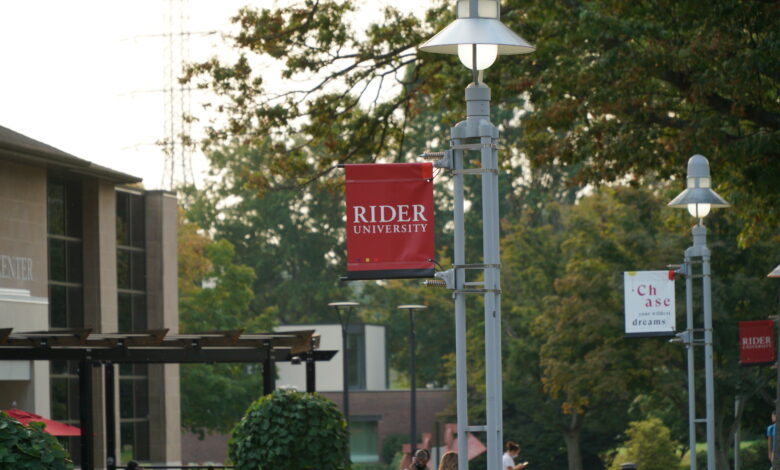
Dell’Omo estimates latest budget cuts will save university $450,000
By Jay Roberson and Shaun Chornobroff
In its latest effort to cut costs on the road to financial stability, Rider has asked a number of departments to give a portion of their annual budgets back to the university.
The administration is asking all departments to take the total of their current budgeted amount for travel, supplies and meals for meetings and remove 20% of that from their budget for the 2024 fiscal year, a measure which Rider President Gregory Dell’Omo estimated will save the university $450,000.
The 2024 fiscal year lasts from July 1, 2023 to June 30, 2024. Dell’Omo said the cuts don’t have to be made exclusively to travel, supplies and meals, but departments must “give back to the university” the equivalent of 20% of those expenses.
“We need savings, but it gives people a little bit more control over their budgets based on what they do,” said Dell’Omo in a March 15 interview with The Rider News.
The president said these cuts, the most recent in a long line since the pandemic rattled the university’s financial state, are a way for the administration to “tighten our belts.” He emphasized that when contextualized in the amount of departments the school has, these cuts aren’t severely hampering any sector of the university.
In addition to the reduction, a 2024 university budget timeline, co-written by Rider’s Senior Vice President and Chief Financial Officer James Hartman and Director of Financial Planning Lisa Tindall, stated a 3% reduction to all budget ceilings has been implemented.
“While we realize that these budget reductions may seem steep, the fact remains that the University’s expenses still far outweigh the revenues we bring in. Balancing the need to deliver on our mission and do it in a financially responsible way falls on all of us,” said the document, which was obtained from a member of Rider’s faculty union.
University members were notified on Feb. 28, according to Associate Vice President for University Marketing and Communications Kristine Brown.
Hartman reflected a similar outlook to Dell’Omo in an interview with The Rider News, specifically stating the university evaluates its cost reduction measures ensuring they don’t impair students.
“What we always try to do as we look at our budget and any budget restrictions, we always try to make sure that we’re not adding lines that are going to affect the student experience. And the lines that we focused on here, do not in any way affect that,” said Hartman.
The Path Forward
As Rider continues to cut costs, the administration remains firm on its goal of bringing the university back to a stable, growing institution by fiscal year 2026, according to Dell’Omo and other members of administration. The latest reductions are one of the many steps the university has taken in an effort to recover financially. Rider has experienced significant loss due to the COVID-19 pandemic, feeling the impact of an empty campus, as a decrease in on-campus residents and declining enrollment, resulted in more than $30 million lost in housing revenue.
With recruiting operating at its most normal since the pandemic uprooted standard proceedings in March 2020, Dell’Omo said he’s already seeing an improvement, a crucial step to financial recovery for the university.
“We’re making progress,” said Dell’Omo. “But remember that the biggest chunk of our path forward, particularly over the next three year plan, clearly is both cost cutting and revenue generation. And the biggest piece obviously is revenue from tuition, making sure we’re on track for enrollments.”
Rider’s chapter of the American Association of University Professors (AAUP) has openly called for Dell’Omo’s removal and given a vote of no-confidence twice during his tenure, citing a multitude of reasons, including the financial strain the university has been under. Contract negotiations over the summer between the union and the administration bled into the school year and a strike was narrowly avoided. Even as Dell’Omo maintains progress is underway, Rider’s faculty union remains pessimistic of administration.
“We are accustomed to seeing these kinds of messages,” said David Dewberry, president of Rider’s AAUP chapter. “It seems like there’s never more resources being given to the institution, we’re just asked to do more with less.”
In the interview, Dewberry said he questioned Dell’Omo’s hopes for the university, specifically saying that if the union heard a “coherent vision, something that we could believe in, something we could buy into, I think that would help.”
When asked by The Rider News what his vision for the school is, Dell’Omo suggested a university that is representative of a post-pandemic world, one that is investing and reallocating funds into programs that will define the future of higher education.
“Even though we’re a university, even though we’re a not-for-profit, we have to be looking at how we can constantly manage our resources,” said Dell’Omo. “That means looking at which programs are still doing well [and] which programs still have a demand out there … but also looking at what new programs that we have to have as the world changes.”
Originally printed in the 3/22/23 issue.


